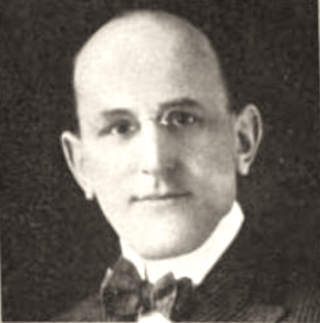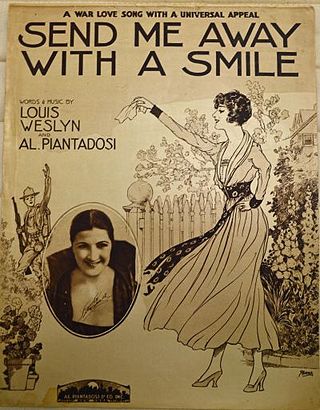Related Research Articles

Fred Fisher was a German-born American songwriter and Tin Pan Alley music publisher.

John Frederick Coots, better known as J. Fred Coots or Fred Coots, was an American songwriter. He composed over 700 popular songs and over a dozen Broadway shows. In 1934, Coots wrote the melody with his then chief collaborator, lyricist Haven Gillespie, for the biggest hit of either man's career, "Santa Claus Is Comin' to Town." The song became one of the biggest sellers in American history.

Raymond Blanning Egan was a Canadian-born American songwriter of popular music. Many of his songs have appeared in films and musical theatre. He often collaborated with composer Richard A. Whiting.
"Love Letters in the Sand" is a popular song first published in 1931.
Laurel Kenneth Sargent was an American big band vocalist and saxophonist, primarily known for his work with the Casa Loma Orchestra in the 1930s and 40s.
Bob Rothberg was a Tin Pan Alley songwriter and lyricist. ASCAP 1936. Educ: New York public schools 1915; DeWitt Clinton High School, New York 1919; accountancy and law, New York Law School, Bachelor of Laws 1928. Educated in music and violin with private instructors. Rothberg is interred at United Hebrew Cemetery on Staten Island.

The Shopworn Angel is a 1928 American part-talking sound romantic drama film directed by Richard Wallace starring Nancy Carroll and Gary Cooper. The film was released by Paramount Pictures using the Western Electric sound-on-film system. Like the majority of films in the early sound era, a silent version was made for theatres who hadn't converted to sound yet by trimming down the portions of the film that featured talking or singing.
John Klenner was a German-born American pianist, composer, and lyricist. He composed both classical and popular music and is best known for writing the song "Just Friends" with Sam M. Lewis in 1931.
"My Adobe Hacienda" is a song composed by Louise Massey and Lee Penny. It first became popular in 1941 with Massey's recorded version, where it placed at #23. The song was most popular in 1947 when Eddy Howard took the song to #2. That year the song was also recorded by Kenny Baker (#16), the Dinning Sisters (#9), and the Billy Williams Quartet (#13). Massey's original recording was re-released, and this time attained a chart position of #16. Between May and June 1947, the song appeared on Your Hit Parade for three weeks. Billboard listed it as 1947's 12th best seller in sheet music. Art Kassel released the song as a Vogue picture disc.
"A Love-Tale of Alsace Lorraine" is a song published in 1928 by Spier and Coslow of New York City. J. Fred Coots and Lou Davis were credited as the composers and lyricists. The song was written for voice, piano, and ukulele. Artist Sydney Leff designed the cover art. On February 25, 1929, a version of the song was released by Victor Records. It was performed by Melody Three, a male vocal trio group.

Dear Old Pal of Mine is a World War I song written by Harold Robe and Gitz Rice. The song was first published in 1916 by G. Ricordi & Co. in New York, NY.

"Lucky Lindy!" is a fox-trot song composed by Abel Baer, with lyrics by L. Wolfe Gilbert. It was published by Harmony in 1927. The song was the first to celebrate Charles Lindbergh's transatlantic flight in the Spirit of St. Louis and his landing in Paris. Hundreds more followed.
"Give a Little Credit to the Navy" is a World War I song written by Buddy DeSylva & Gus Kahn and composed by Albert Gumble. This song was published in 1918 by Jerome H. Remick & Co., in Detroit, MI.
"At Sundown (When Love Is Calling Me Home)" is a foxtrot-style song written by Walter Donaldson. The song was published in 1927 by Leo Feist, Inc. in New York City. This hit song reportedly sold more than two million disks in various versions in the late 1920s. It has been used in several movie musicals including Glorifying the American Girl, This Is the Life, Music for Millions, Margie, The Fabulous Dorseys, Love Me or Leave Me, and The Joker Is Wild.
"Blue bell: March Song and Chorus" is a march style song composed by Theodore F. Morse and written by Edward Madden. The song was published in 1904 by F.B. Haviland Pub. Co., in New York, NY. The cover, illustrated by Rose Starmer, depicts a soldier and a young woman. The song was recorded and popularized by Byron Harland and Frank Stanley, the Haydn Quartet, and Henry Burr.
Harold A. Robe (1881-1946) was an early 20th century American lyricist. He is known for penning several popular songs, most notably Dear Old Pal of Mine. For many of his songs, Robe collaborated with composer Gitz Rice. Other notable songs include, Because You're Here, Mary Lee , and Never Swap Horses When You're Crossing a Stream.
"Honey Boy" is a Tin Pan Alley song for voice and piano written by Jack Norworth and composed by Albert Von Tilzer. The song was first published in 1907 by The York Music Co. in New York, NY.
Lou Davis was an American songwriter, and author associated with Tin Pan Alley. He was also a businessman in the wholesale meat business. His primary musical collaborators were Abel Baer, Henry Busse, Harold Arlen, Henry Lange, and J. Fred Coots. Several of his most notable songs include "Hot Lips", "A Precious Little Thing Called Love", "Deep in the Arms of Love", "Here Comes My Ball and Chain", and "I'm Croonin' a Tune About June".

Send Me Away With A Smile is a World War I song written by Louis Weslyn and composed by Al Piantadosi. The song was first published in 1917 by Al. Piantadosi & Co., Inc. in New York, NY. The sheet music cover depicts a woman waving to a soldier from a fenced yard with an inset photo of Rita Gould.
"My Heart Tells Me" is a song written by Harry Warren with lyrics by Mack Gordon. It is the theme to the 1943 American musical film Sweet Rosie O'Grady, in which it is sung by lead actress Betty Grable. A 1940s standard, the song has been recorded by numerous artists, including Frank Sinatra, Tony Bennett, Nat King Cole, and Etta Jones. The film's popularity contributed to the commercial success of the version of the song recorded by bandleader Glen Gray and his Casa Loma Orchestra with vocals by singer Eugenie Baird. Titled "My Heart Tells Me ", it topped The Billboard's National Best Selling Retail Records chart for five weeks in 1944.
References
- ↑ Davis, Lou, J. Fred Coots, and Leff. 1928. A precious little thing called love: song. New York City: Remick Music Corp. OCLC 22914061
- ↑ Tyler, Don. Hit songs, 1900-1955: American popular music of the pre-rock era. Jefferson, N.C.: McFarland, 2007. P. 165 ISBN 978-0-7864-2946-2. OCLC 76961274
- ↑ Davis, Lou, J. Fred Coots, and Leff. 1928. A precious little thing called love: song. New York City: Remick Music Corp. OCLC 22914061
Bibliography
- Tyler, Don. Hit songs, 1900-1955: American popular music of the pre-rock era. Jefferson, N.C.: McFarland, 2007. ISBN 978-0-7864-2946-2. OCLC 76961274